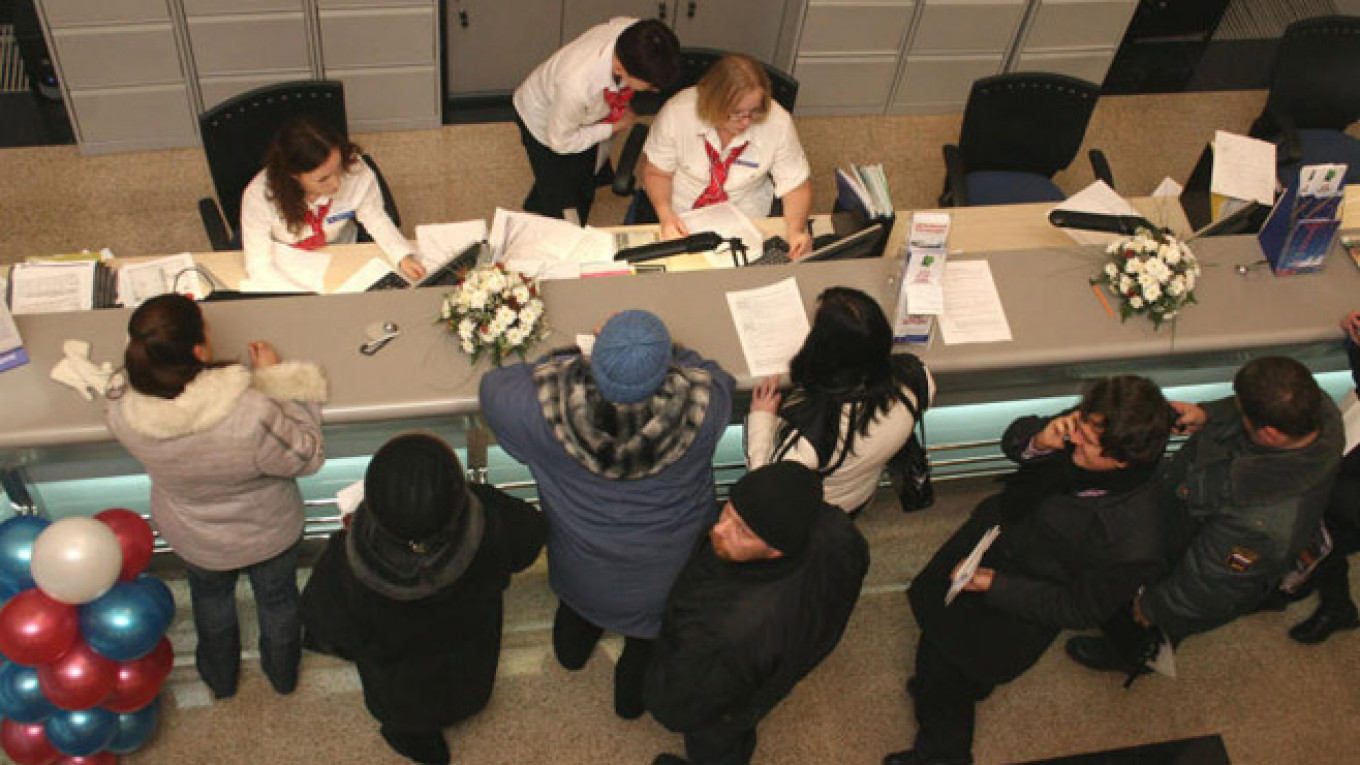Consumer confidence in Russia's financial system is falling, with half of Russians saying they don't trust banks and are using such services less, in a troubling signal for a system under pressure from Western sanctions and more sensitive than ever to outflows of depositors, a recent study showed.
In the first half of this year, more than 47 percent of Russians agreed with the following statement: "I do not trust banks, they never tell the whole story." This number has shot up from about 43 percent in the second half of last year and 41 percent in the six months before that, the survey by researcher Synovate Comcon showed.
Russians' faith in banks has been assailed from within and without this year. The value of the ruble has dropped over 20 percent since January, bringing with it still painful memories of the 1998 financial crisis — when banks dropped like flies and many Russians lost their entire life's savings — and of the 2008-09 crisis, when Russia's economy contracted by 9 percent.
Tellingly, distrust for lenders is highest among older Russians: 54 percent of people between the ages of 55 and 75 admitted to not trusting banks during the survey.
Meanwhile, Russia's Central Bank has elevated fears with a concerted crackdown on risky lending and money-laundering in the sector that has seen a steady drip-drip of headlines as 66 out of Russia's 869 banking institutions lost their licenses in this year alone.
And then along came sanctions. Western sanctions over the crisis in Ukraine have cut off state-owned Russian lenders from U.S. and EU capital markets, leaving them with multibillion-dollar debts to foreign lenders that cannot be rolled over and must instead be repaid. This, along with rising inflation and a tightening of the Central Bank's monetary policy, has forced them to push up interest rates and, in some cases, go cap in hand to the government for support.
As trust falls, so has the number of people using banking services, which dropped from 63 percent in the second half of last year to about 61 percent in the latest survey. Use of banking services had risen steadily over the previous year and a half.
Ruble-denominated deposits have been struck particularly hard: The amount of money in ruble deposits fell about 0.4 percent over the first eight months of this year, after rising over 12 percent in 2013, according to data from the Central Bank.
Deposits in euros and dollars, on the other hand, have risen by 17 percent already this year. As during the previous financial crises, Russians have hastened to safeguard their savings in hard currency as the ruble falls — unwittingly pushing the Russian currency down even further.
But it is too early to talk of a mass outflow of depositors big enough to threaten banks' financial strength. The total amount of both ruble and hard currency deposits increased 2.6 percent from January to September, when it stood at 17.4 trillion rubles ($430 billion), according to the Central Bank.
This is far below the 19 percent rise seen last year, however, and banks are already making moves to entice customers back. Sberbank and VTB — two state banks that are by far the country's biggest — both announced increases in rates on deposits earlier this week.
The range of factors that have struck Russians' faith in the banking system also appears to be transforming the way that they select their lenders. The number of people who consider a good reputation important has dropped from 45 to 42 percent, and the value of experience on the market has similarly fallen in public opinion.
State support, on the other hand, is increasingly popular. While just 27 percent took this into account at the end of 2013, 32 percent do now, putting such players as Sberbank and VTB — both of which are facing sanctions — at an advantage on their home market.
The survey was based on questionnaires filled out by 14,000 respondents of 16 years or older living in cities with populations of over 100,000. The margin of error was less than 1 percent.
Contact the author at [email protected]
A Message from The Moscow Times:
Dear readers,
We are facing unprecedented challenges. Russia's Prosecutor General's Office has designated The Moscow Times as an "undesirable" organization, criminalizing our work and putting our staff at risk of prosecution. This follows our earlier unjust labeling as a "foreign agent."
These actions are direct attempts to silence independent journalism in Russia. The authorities claim our work "discredits the decisions of the Russian leadership." We see things differently: we strive to provide accurate, unbiased reporting on Russia.
We, the journalists of The Moscow Times, refuse to be silenced. But to continue our work, we need your help.
Your support, no matter how small, makes a world of difference. If you can, please support us monthly starting from just $2. It's quick to set up, and every contribution makes a significant impact.
By supporting The Moscow Times, you're defending open, independent journalism in the face of repression. Thank you for standing with us.
Remind me later.






